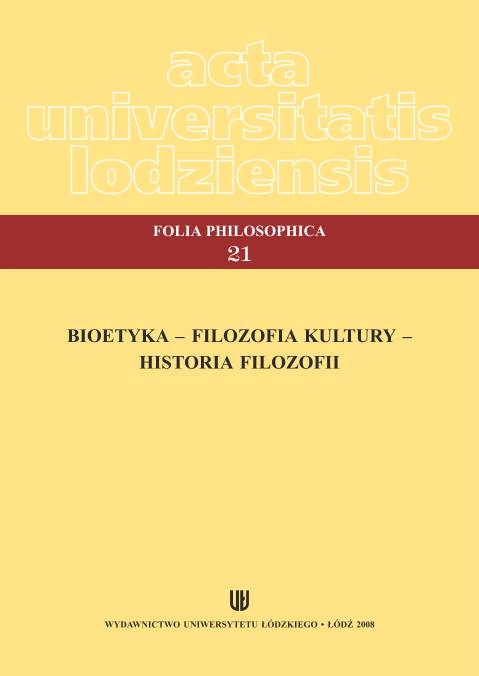Wolność egoisty
DOI:
https://doi.org/10.18778/0208-6107.21.12Abstrakt
The main purpose of this article is to outline the idea of the anarchistic egoism included in Max Stirner's "Ego and His Own". I tried to represent Stirner as an original philosopher who visibly distinguished himself among other thinkers of his days. My aim was also defend him from various attacks of his critics and adversaries who reproached him for being inconsistent or perplexed in the very vulnerable spots of his work. In my opinion 'being awkward' which Camus accuses Stirner of, is nothing else than a tough consequence of the egoistic philosophy which forced the author of "Ego and His Own" to stop his deduction in some point. By referring to Nietzsche and existentialists I endeavoured to show Stirner's Egoist as a precursor of the Nietzsche's Superman and the Camus's Stranger. In the evolution of an idea this two directions were two different ways of extending the construction which foundations were laid down by Stirner. That is why I find Max Stirner one of the most influential thinker of the 10th century who had a great impact on formation of the new look on man and his world. This article is about solitude, alienation, egoism, strength and power which born every time when the conscious and sovereign human being is faced with the indifferent, trivial and inert world.
Bibliografia
[Banasiak] B. Banasiak, Filozofia integralnej suwerenności. Zarys systemu Markiza de Sade, Łódź 2006.
Google Scholar
[Camus 1] A. Camus, Obcy, przeł. M. Zenowicz, Warszawa 1985.
Google Scholar
[Camus 2] A. Camus, Człowiek zbuntowany, przeł. J. Guze, Kraków 1993.
Google Scholar
[Camus 3] A. Camus, Mit Syzyfa i inne eseje, przeł. J. Guze, Warszawa 2004.
Google Scholar
[Deleuze 1] G. Deleuze, Nietzsche, przeł. B. Banasiak, Warszawa 2000.
Google Scholar
[Deleuze 2] G. Deleuze, Nietzsche i filozofia, przeł. B. Banasiak, Warszawa 1998.
Google Scholar
[Heidegger] M. Heidegger, Wyzwolenie, przeł. J. Mizera, Kraków 2001.
Google Scholar
[Hobbes] Th. Hobbes, Lewiatan, czyli materia forma i władza państwa kościelnego i świeckiego, przeł. Cz. Znamierowski, Warszawa 1954.
Google Scholar
[Kołakowski] L. Kołakowski, Jeśli Boga nie ma, Kraków 1988.
Google Scholar
[Kusak] L. Kusak, Wstęp, w: M. Stirner, Jedyny i jego własność, przeł. J. i A. Gajlewiczowie, Warszawa 1995.
Google Scholar
[Marks, Engels] K. Marks i F. Engels, Manifest Partii Komunistycznej, Warszawa 1969.
Google Scholar
[Nietzsche 1] F. Nietzsche, Tak mówi! Zaratustra, przeł. G. Sowinski, Kraków 2005.
Google Scholar
[Nietzsche 2] F. Nietzsche, Antychryst, przeł. L. Staff, Kraków 2006.
Google Scholar
[Pinker] S. Pinker, Tabula rasa, przeł. A. Nowak, Gdańsk 2005.
Google Scholar
[Sartre] J. P. Sartre, Egzystencjalizm jest humanizmem, przeł. J. Krajewski, Warszawa 1998.
Google Scholar
[Stirner] M. Stirner, Jedyny i jego własność, przeł. J. i A. Gajlewiczowie, Warszawa 1995.
Google Scholar
Pismo Święte Starego i Nowego Testamentu, Poznań-Warszawa 1980.
Google Scholar
Pobrania
Opublikowane
Jak cytować
Numer
Dział
Licencja

Praca jest udostępniana na licencji Creative Commons Attribution-NonCommercial-NoDerivatives 3.0 Unported License.












